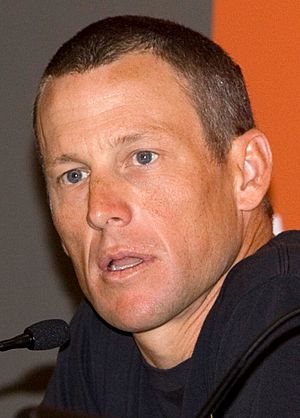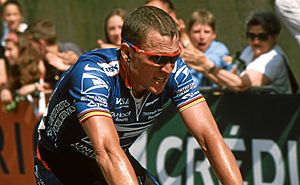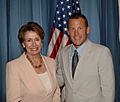Lance Armstrong facts for kids

Armstrong before the 2009 Tour Down Under
|
|||
| Personal information | |||
|---|---|---|---|
| Full name | Lance Edward Armstrong | ||
| Nickname | Le Boss Big Tex |
||
| Born | September 18, 1971 Richardson, Texas, U.S. |
||
| Height | 1.77 m (5 ft 9+1⁄2 in) | ||
| Weight | 75 kg (165 lb) | ||
| Team information | |||
| Discipline | Road | ||
| Role | Rider | ||
| Rider type | All-rounder | ||
| Major wins | |||
|
|||
Lance Edward Armstrong (born September 18, 1971) is an American former professional road racing cyclist. He became world-famous for winning the Tour de France a record seven times in a row from 1999 to 2005.
However, in 2012, his career took a dramatic turn. An investigation found that Armstrong had used performance-enhancing drugs, which are substances that give athletes an unfair advantage. As a result, he was stripped of his seven Tour de France titles and banned for life from competing in official cycling events.
Before his cycling fame, Armstrong was a talented triathlete as a teenager. ..... After his recovery, he started the Lance Armstrong Foundation, now known as the Livestrong Foundation, to help other people with cancer.
Contents
Early Life and Career
Lance Armstrong was born in Richardson, Texas. He started competing in sports at a young age. By the time he was 16, he was a professional triathlete. A triathlon is a race that includes swimming, cycling, and running.
In 1992, Armstrong decided to focus only on cycling and joined the Motorola professional cycling team. He quickly found success, winning the World Road Race Championship in 1993. He also won several other important races and stages in the Tour de France between 1993 and 1996.
Battle with Cancer
..... The cancer had spread to his lungs, abdomen, and brain. Doctors told him he had a very low chance of survival.
Armstrong underwent surgery and difficult chemotherapy treatments. He chose a specific type of treatment to avoid lung damage, which helped save his cycling career. By February 1997, he was declared cancer-free. This experience led him to create the Livestrong Foundation to support cancer patients and survivors.
Return to Cycling and Tour de France Wins
Armstrong made a comeback to cycling in 1998 with the U.S. Postal Service team. Many people were unsure if he could compete at the highest level again. But in 1999, he shocked the world by winning his first Tour de France. The Tour de France is the most famous and difficult cycling race in the world.
This was the start of an amazing winning streak. Armstrong went on to win the Tour de France every year for seven years in a row, from 1999 to 2005. During these years, he had a famous rivalry with German cyclist Jan Ullrich. Their battles in the mountains of France were watched by millions of people.
After his seventh win in 2005, Armstrong retired from cycling. He wanted to spend more time with his family and his foundation. However, he returned to the sport in 2009 and finished third in the Tour de France that year. He retired for a final time in 2011.
Personal Life
Armstrong has five children. He has three children with his first wife, Kristin Richard, and two with his wife, Anna Hansen. He lives in Austin, Texas, and Aspen, Colorado.
He has been involved in politics, mostly to support cancer research. He is friends with former U.S. President George W. Bush. In 2007, he helped pass a $3 billion plan in Texas to fund cancer research.
Even after the scandal, Armstrong's Livestrong Foundation continues to help people affected by cancer. The foundation is famous for its yellow "Livestrong" wristbands, which have raised millions of dollars.
Images for kids
-
Armstong riding in the 2010 Tour de France in his RadioShack jersey
-
President George W. Bush and Armstrong mountain biking at the president's Prairie Chapel Ranch
-
Armstrong and Congresswoman Nancy Pelosi
See also
 In Spanish: Lance Armstrong para niños
In Spanish: Lance Armstrong para niños
 | William L. Dawson |
 | W. E. B. Du Bois |
 | Harry Belafonte |









